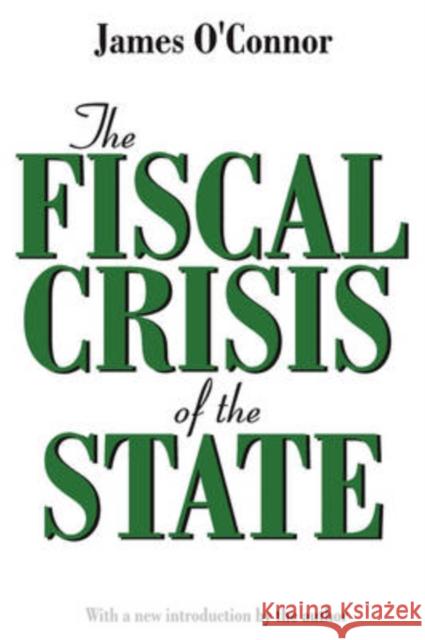The Fiscal Crisis of the State » książka
The Fiscal Crisis of the State
ISBN-13: 9780765808608 / Angielski / Miękka / 2001 / 304 str.
The Fiscal Crisis of the State
ISBN-13: 9780765808608 / Angielski / Miękka / 2001 / 304 str.
(netto: 235,63 VAT: 5%)
Najniższa cena z 30 dni: 226,63
ok. 30 dni roboczych.
Darmowa dostawa!
Fiscal Crisis of the State refers to the tendency of government expenditures to outpace revenues in the U.S. in the late 1960s and early 1970s, but its relevance to other countries of the period and also in today's global economy is evident. When government expenditure constitutes a larger and larger share of total economy theorists who ignore the impact of the state budget do so at their own (and capitalism's) peril. This volume examines how changes in tax rates and tax structure used to regulate private economic activity. O'Connor theorizes that particular expenditures and programs and the budget as a whole can be understood only in terms of power relationships within the private economy. O'Connor's analysis includes an anatomy of American state capitalism, political power and budgetary control in the United States, social capital expenditures, social expenses of production, financing the budget, and the scope and limits of reform. He shows that the simultaneous growth of monopoly power and the state itself generate an increasingly severe social crisis. State monopolies indirectly determine the state budget by generating needs that the state must satisfy. The state administration organizes production as a result of a series of political decisions. Over time, there is a tendency for what O'Connor calls the social expenses of production to rise, and the state is increasingly compelled to socialize these expenses. The state has three ways to finance increased budgetary outlays: create state enterprises that produce social expenditures; issue debt and borrowing against further tax revenues; raise tax rates and introduce new taxes. None of these mechanisms are satisfactory. Neither the development of state enterprise nor the growth of state debt liberates the state from fiscal concerns. Similarly, tax finance is a form of economic exploitation and thus a problem for class analysis. O'Connor contends that the fiscal crisis of the capitalist state is the inevitable consequence of the structural gap between state expenditures and revenues. The state's only way to ameliorate the fiscal crisis is to accelerate the growth of the social-industrial complex. In his new introduction, O'Connor describes The Fiscal Crisis of the State as "the product of a unique combination of personal, intellectual, and political experiencesa." He goes on to explain the origins of his theory and the consequences of The Fiscal Crisis of the State. He answers the question "is there a fiscal crisis today?" and discusses changes in fiscal policy since the '60s and '70s.











